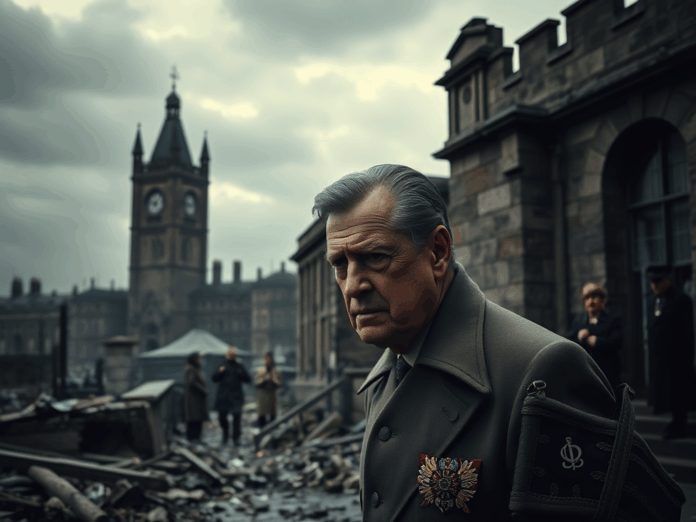Special Correspondent, Home Service
After spending over a fortnight in a fortified estate in the British countryside during the German bombing of London, His Majesty King George VI, 45, may now consider reappearing — if only briefly — as reports emerge of a lull in Luftwaffe air raids.
The King is understood to have been moved to a secure location following intelligence that Berlin was actively targeting Britain’s senior leadership. Even some senior cabinet officials are rumoured to have been unable to contact him directly, relying instead on intermediaries and pre-written statements.
Although Prime Minister Winston Churchill is said to have advised Hitler against targeting the monarch personally, the German High Command has not ruled out the possibility of a decapitation strike.
When — or indeed if — His Majesty returns to public view, he will witness a country physically scarred and emotionally weary. And though he will likely stand before the BBC microphones proclaiming resilience, and perhaps even “victory through perseverance”, the truth is Britain enters a new and far more uncertain chapter.
A diminished monarch for a diminished nation
While Whitehall insists morale remains high, voices of discontent have grown louder — particularly among war-weary civilians in blitzed cities. With entire boroughs of London in ruins, and with food and fuel supplies strained to the brink, some now question whether the government’s strategy of outright defiance is sustainable.
“What was it all for?” is the quiet question behind closed curtains, even among once-loyal civil servants.
“This is not the Britain of 1939,” says Professor Harold Elsmore of Oxford University’s School of Political Thought. “This is a country on fire — spiritually and literally. If the Crown cannot reassert moral leadership, there may be lasting consequences.”
Stirrings in the shadows
In recent days, BBC Home Service has learned that certain influential members of Parliament have begun urging the Archbishop of Canterbury and other senior clergy to consider a temporary regency — a move that would have been unthinkable just months ago.
“There must be a reckoning,” says an anonymous backbencher from the Midlands. “The people have sacrificed everything. The question now is: where is the King?”
Despite signs of extraordinary civilian solidarity — neighbours digging out rubble with bare hands, grocers giving away rations — there’s also a sense of abandonment. The symbol of national unity, critics argue, has been conspicuously absent during the darkest hour.
‘Resilience or resentment?’
In areas worst hit by bombing — Coventry, Liverpool, the East End of London — a quiet resentment is said to be taking root. The question isn’t just whether Britain can defeat Hitler, but whether the constitutional monarchy can survive the trauma intact.
“People rallied not to defend the monarchy, but to defend each other,” said one local councillor from Stepney. “We’re tired, we’re proud, but we’re not blind.”
There are rumours that even inside Buckingham Palace — now mostly evacuated — a faction of staff and advisors fear that the longer the King remains out of sight, the harder it will be to restore his authority.
Danger remains
Meanwhile, the Luftwaffe is far from finished. Intelligence suggests that long-range bombing campaigns may soon extend to industrial towns in the north. The RAF remains stretched, and while Britain’s resolve is not broken, its infrastructure certainly is.
The King’s return — should it happen soon — will need to be more than ceremonial. It must be meaningful, decisive, and seen. For now, he remains the monarch of a kingdom in survival mode.
And many are wondering — quietly but insistently — whether his reign will outlast the Reich.
If you have read to the end, please note that this is just a parody of an article recently published by the BBC about Ayatollah Khamenei.
